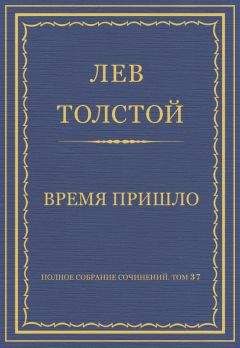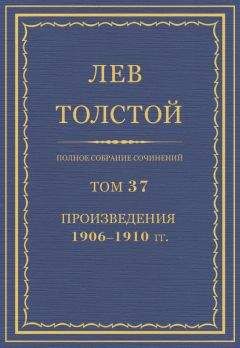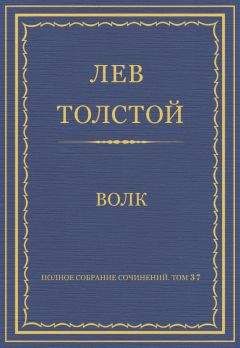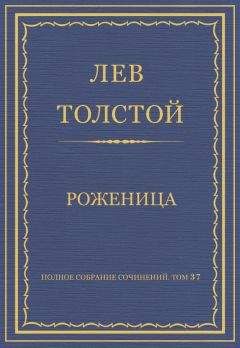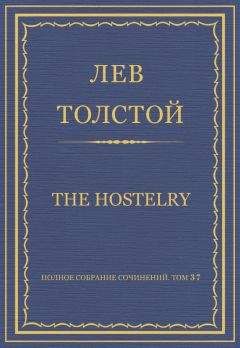Лев Толстой - Полное собрание сочинений. Том 37. Произведения 1906–1910 гг. Letter to a Hindoo
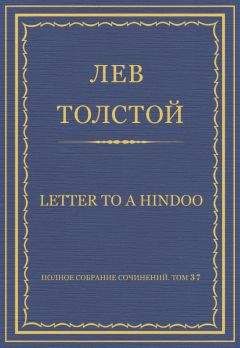
Обзор книги Лев Толстой - Полное собрание сочинений. Том 37. Произведения 1906–1910 гг. Letter to a Hindoo
Лев Николаевич
Толстой
Letter to a Hindoo
(Письмо к индусу)
(1908—1909 гг.)
Государственное издательство
«Художественная литература»
Москва – 1956
Электронное издание осуществлено
в рамках краудсорсингового проекта
«Весь Толстой в один клик»
Организаторы:
Государственный музей Л.Н. Толстого
Музей-усадьба «Ясная Поляна»
Компания ABBYY
Подготовлено на основе электронной копии 37-го тома
Полного собрания сочинений Л.Н. Толстого, предоставленной
Российской государственной библиотекой
Электронное издание
90-томного собрания сочинений Л.Н. Толстого
доступно на портале www.tolstoy.ru
Предисловие и редакционные пояснения к 37-му тому Полного собрания сочинений Л.Н. Толстого включены в настоящее издание
Если Вы нашли ошибку, пожалуйста, напишите нам
[email protected]
Перепечатка разрешается безвозмездно
–
Reproduction libre pour tous les pays.
Предисловие к электронному изданию
Настоящее издание представляет собой электронную версию 90-томного собрания сочинений Льва Николаевича Толстого, вышедшего в свет в 1928—1958 гг. Это уникальное академическое издание, самое полное собрание наследия Л.Н.Толстого, давно стало библиографической редкостью. В 2006 году музей-усадьба «Ясная Поляна» в сотрудничестве с Российской государственной библиотекой и при поддержке фонда Э. Меллона и координации Британского совета осуществили сканирование всех 90 томов издания. Однако для того чтобы пользоваться всеми преимуществами электронной версии (чтение на современных устройствах, возможность работы с текстом), предстояло еще распознать более 46 000 страниц. Для этого Государственный музей Л.Н. Толстого, музей-усадьба «Ясная Поляна» вместе с партнером – компанией ABBYY, открыли проект «Весь Толстой в один клик». На сайте readingtolstoy.ru к проекту присоединились более трех тысяч волонтеров, которые с помощью программы ABBYY FineReader распознавали текст и исправляли ошибки. Буквально за десять дней прошел первый этап сверки, еще за два месяца – второй. После третьего этапа корректуры тома и отдельные произведения публикуются в электронном виде на сайте tolstoy.ru.
В издании сохраняется орфография и пунктуация печатной версии 90-томного собрания сочинений Л.Н. Толстого.
Руководитель проекта «Весь Толстой в один клик»
Фекла Толстая
Л. Н. ТОЛСТОЙ. 1908
LETTER TO A HINDOO
All that exists is One; people only call this One by different names.
Veddas.God is love, and he that abideth in love abideth in God, and God abideth in him.
1 Ep. John. Chap. 4.God is one Whole; we are the parts.
Exposition of the teaching of the Veddas by Vivekananda.I
Do not seek rest in that plane where the earthly gives birth to thoughts and desires, for if thou dost, thou wilt be dragged through the rough wilderness of life, which is not of Me. Whenever thou feelest that thy feet are becoming entangled in the interlaced roots of life, know then that thou hast strayed from the path to which I beckon thee, for I have placed thee in broad smooth paths which are strewn with flowers.
I have put a light before thee, which thou can’st follow and thus run without stumbling.
Krishna P. 212.I received your letter and the two issues of the magazine. Both were intensely interesting to me; indeed, the oppression of a majority by the minority of a people and the corruption which flows from it, is a phenomenon which has always occupied my mind and at present is entirely occupying my attention. I will endeavour to convey to you what I think, both in a particular and a general way, about those causes from which those dreadful calamities have arisen and do arise, of which you write in your letter and which are also mentioned in the two numbers of the Hindoo magazine you sent me.
The causes, owing to which this astonishing spectacle arises, of the majority of the labouring classes submitting to a mere handful of idlers whom it permits to dispose not only of its labour but also of its very life, are always and everywhere the same; whether the oppressors and the oppressed belong to the same, or, as is the case in India and in other countries, where the dominant class belongs to an entirely different nation from those oppressed.
It appears especially strange of India, for here we have a people of 200 millions of individuals, highly endowed with spiritual and physical powers, in absolute subjection to a small clique, composed of persons utterly alien in thought and aspiration and altogether inferior to those whom they enslave.
These causes, as one can easily see from your letter, from the articles in «Free Hindustan», from the highly interesting writings of the Hindoo Swami Vivekananda and others, are in accord with that which causes the distress of all the peoples of our time; in the absence of a rational religious teaching which, while elucidating the meaning of life to the people in an equal way, would also make clear the higher law, which should be a guide to conduct, and in the substitution for them of the more than dubious propositions of a false religion and pseudo science, and in the immoral conclusions called civilization derived from both.
One has already seen not only from your letter and from the articles in «Free Hindustan», but also from the entire Hindoo political literature of our times, that the majority of the leaders of public opinion among the native races of India, while no longer ascribing any significance to those religious teachings which were professed, and are professed by the Hindoo peoples, now find the sole possibility of deliverance from the oppression they endure, in embracing those anti-religious and subtly immoral forms of social order in which the English and other pseudo Christian nations live to-day. Nothing shows more clearly than this, the total absence of religious consciousness in the minds of the present day leaders of Hindoo peoples, than does this tendency to instil into the hearts of the natives the acceptance of the forms of life in operation amongst European nations. Meanwhile, in the absence of this true religious consciousness and the guidance of conduct flowing from it, in the absence which is common in our times to all the nations of the East and the West, from Japan to England and America: lies the chief if not the sole cause of the enslavement of all the Indian peoples by the English.
II
О ye, who see perplexities over your heads and beneath your feet, to the right and to the left! you will be an eternal enigma unto yourselves, until you become humble and joyful as children. Then you will find Me, and having found Me in yourselves, you will rule over worlds and looking out from the great world within to the little world without, you will bless everything that is and find all is well with time and with you.
Krishna P. 164.In order to make my thoughts clear I must go back a considerable time.
We do not know, and cannot know (I boldly say – we need not) how mankind lived millions, or even tens of thousands of years ago; but in all those times of which we have any reliable knowledge, we find that Humanity has lived in separate tribes, clans, nations, in which the majority, submitting to the apparently inevitable, has permitted the coercive rule of one, or several persons of the minority. We know this beyond a doubt. Notwithstanding the external diversity of events and persons, such an organisation of human life has manifested itself in a similar way, in all the countries of whose previous history we know anything. And such an order of life, the further back you go, was always looked upon as the necessary basis for concordent social intercourse by both the rulers and the ruled.
Thus it was everywhere. But in spite of such an external order of life having existed for centuries and continuing even until now, a long time ago – thousands of years before our time, in the midst of different nations and often from out of the very centre of this order of life resting on coercion, one and the same thought has been expressed, – that in every individual one spiritual source manifests itself, which is life itself, and that this Spiritual source tends to unification with everything which is homogeneous with it, and attains this unification by love. This thought in its various forms has been expressed with more or less completeness and lucidity at different times and in various places. It has been expressed in Brahminism, Judaism, Mazdeism (the teaching of Zoroaster), Buddhism, Taoism, Confucianism, in the writings of the Greek and Roman sages, and in Christianity and Mohammedanism. Already the fact that one and the same thought has been expressed in the midst of the most diverse nations and at different times and places, indicates that this thought was inherent in human nature and contained the truth in itself.
But this truth appeared to those who considered that the only possible way of uniting people into societies, was violence on the part of one set to others to be in opposition to the existing order, and, moreover, at the time of its first appearance, it was expressed in such a vague fragmentary manner, that although the people embraced it as a theory, they were unable to accept it as an authoritative guidance for conduct. Besides, in regard to all the expressions of this truth as it was gradually proclaimed amongst people whose life was founded on violence, always occurred one and the same thing, vis. those who enjoyed the benefits derived from power finding that the recognition by the people of this truth undermined their position, consciously or unconsciously distorted this truth by every means in their power, attaching to it attributes and meanings totally foreign to it, and also opposed its dissemination by downright violence. Thus the truth which is so natural to humanity – that human life should be guided by the spiritual principle which is the foundation of human life and manefests itself in love, – in order to enter man’s consciousness had to struggle not only with the incompleteness of its expression and the intentional and unintentional distortions of it, but also with deliberate violence which compels by means of punishments and persecutions the acceptance of that explanation of the religious law established by the authorities, which is opposed to this truth. Such a misrepresentation and obscuration of the new but as yet imperfectly explained truth, took place everywhere, in Confucianism, Taoism, Buddhism, Christianity, in Mohammedanism and also in your Brahminism.
III
My hand has sowed love everywhere, giving unto all that will receive. Blessings are offered unto all my children, but many times in their blindness they fail to see them. How few there are who gather the gifts which lie in profusion at their feet; how many there are who, in wilful waywardness, turn their eyes away from them and complain with a wail that they have not that which I have given them! Many of them defiantly repudiate not only my Gifts, but Me also, Me, the Source of all blessings and the Author of their Being.
Krishna P. 161.O, tarry awhile from the turmoil and strife of the world. I will beautify and quicken thy life with love and with joy, for the light of the Soul is love. Where love is there is contentment and peace, and where there is contentment and peace there am I also in their midst.
Krishna P. 163—164.The aim of the Sinless One consists in acting without causing sorrow to others, although he could attain to great power by ignoring their feelings.
The aim of the Sinless one lies in not doing evil unto those who have done evil unto him.
If a man causes suffering even to those who hate him without any reason, he will ultimately have grief not to be overcome.
The punishment of evil doers consists in making them feel ashamed of themselves by doing them a great kindness.
Of what use is superior knowledge in the one, if he does not endeavour to relieve his neighbour's wants as much as his own?
If, in the morning a man wishes to do evil unto another, in the evening the evil will return to him.
Hindoo Kural.This has taken place everywhere. The fact that love is the highest moral feeling was accepted universally, but the truth itself was interwoven with many and varied falsehoods, which so distorted it, that nothing but mere words remained, out of this recognition of love as the highest moral feeling. The theory was advanced that this highest moral feeling is applicable only to the individual life, that it was good only for home use, – but in social life all forms of violence, prisons, executions, wars, involving acts diametrically opposed to the feeblest sensation of love, were regarded as indispensable for the protection of the majority against evil doers. Notwithstanding that common sense clearly indicates, that if one set of people can arrogate to themselves the right to decide as to which people are to be subjected to all kinds of coercion for the supposed welfare of the many, it naturally follows that those few individuals to whom violence is so applied could also come to the same conclusion with regard to the ruling caste which subjected them to violence: and although the great religious teachers, – Brahmin, Buddhist and especially Christian, – anticipating this perversion of the law of love, directed attention to the one inevitable condition of love: the enduring of affronts, injuries, all kinds of violence without resisting the evil by evil, – mankind continued to accept what was incompatible: the beneficence of love, and with it the resistance of evil by violence, which is and must be opposed to love. And such teachings, in spite of the palpable contradiction which is in them, have taken such a deep hold upon the people, that while believing in the beneficiency of love, people fail to question the lawfulness of an order of life founded on coercion, which includes the imposition not only of tortures but also of death, by some persons upon others.
